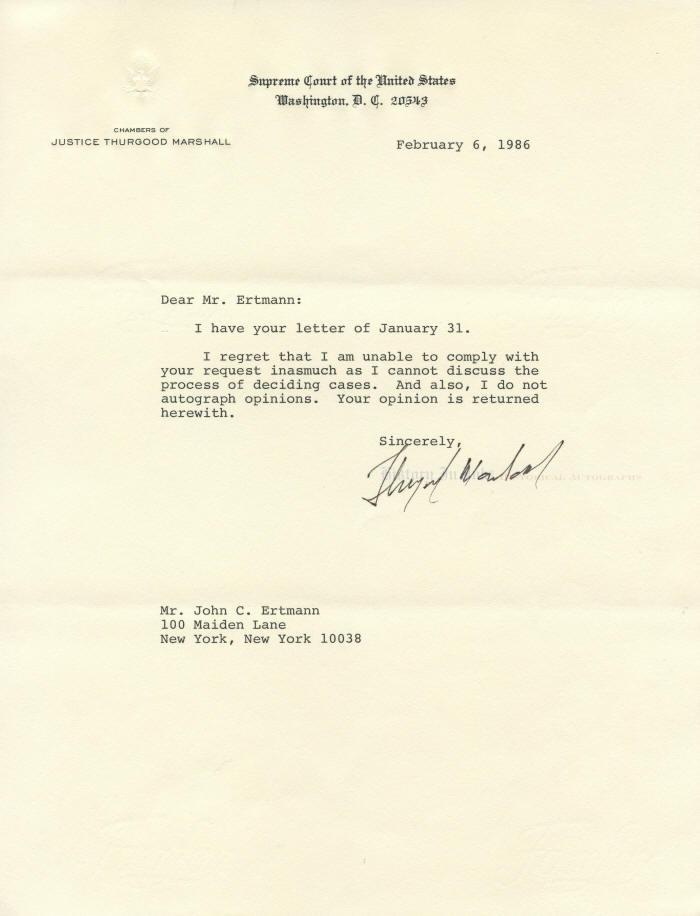1906409
Thurgood Marshall
Scroll down to see images of the item below the description
“I cannot discuss the process of deciding cases”
Thurgood Marshall, 1908–1993. Associate Justice, Supreme Court of the United States, 1967–1991. Typed Letter Signed, Thurgood Marshall, one page, 8½” x 11”, on stationery of the Supreme Court of the United States, Washington, D.C., February 6, 1986.
Marshall declines to discuss the inner workings
of the Supreme Court and to sign a copy of the first
opinion that he wrote for the Court after his appointment.
He writes, in part: “I regret that I am unable to comply
with your request inasmuch as I cannot discuss the process of deciding
cases. And also, I do not autograph opinions. Your opinion is
returned herewith.”
Marshall’s first opinion for the Court was Mempa v. Rhay, 389
U.S. 128 (1967), in which a unanimous Court held that states must provide
lawyers at the time of sentencing for criminal defendants who plead guilty
and are placed on probation but then are sentenced when their probations are
revoked. One might have thought that the liberal Marshall would have
been proud to autograph a copy of that decision.
In 1967,
President Lyndon B. Johnson appointed Marshall, who was serving as Solicitor
General, to succeed Justice Tom C. Clark, who retired in the wake of Johnson’s
appointment of his son, Ramsey Clark, as Attorney General. Marshall
became the first African-American to be appointed a Justice.
Marshall had a
stellar career as a lawyer for the NAACP. While at the NAACP, he represented
civil rights claimants all over the United States and won an astounding 32 of 35 cases
before the Supreme Court. Among
This is a very nice letter. It is on the engraved, blind-embossed
stationery of the Supreme Court. Marshall has signed in what appears
to be a black rollerball pen, which has left a bit of feathering around some
of the letters. The letter is in very fine condition, and only two
normal mailing folds keep it from being extra fine.
Marshall’s letters are scarce, in our experience. This is a
particularly nice example from an historic Justice.
Unframed.
This item has been sold.
Click
here to see more Supreme Court items.
![]() them
them![]() were Smith v. Allwright (1940), which declared Texas’s
exclusion of black voters from primary elections unconstitutional; Sweatt
v. Painter (1950), which declared “separate but equal”
facilities for black
were Smith v. Allwright (1940), which declared Texas’s
exclusion of black voters from primary elections unconstitutional; Sweatt
v. Painter (1950), which declared “separate but equal”
facilities for black![]() professionals
and graduate students in state universities
professionals
and graduate students in state universities![]() unconstitutional; and Brown v. Board of Education (1954), which
declared unconstitutional the racial segregation of public schools.
unconstitutional; and Brown v. Board of Education (1954), which
declared unconstitutional the racial segregation of public schools.![]() President John F. Kennedy appointed him to the United States Court of
Appeals for the Second Circuit, in New York, before Johnson made him
Solicitor General.
President John F. Kennedy appointed him to the United States Court of
Appeals for the Second Circuit, in New York, before Johnson made him
Solicitor General.







